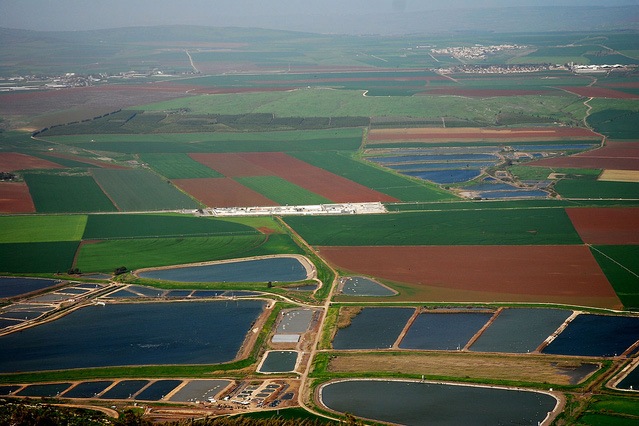Israel's advanced irrigation method has turned arid desert into a place to grow vegetables and fish
Israel is one of the major fresh food exporters in the world market and is a leading country in agricultural technology, though more than 50% of the land is desert and the climate is quite arid, lack of water. .
In this Middle Eastern country, only about 20% of the land is eligible for agriculture. Despite that, the agricultural sector still accounts for 2.5% of GDP and 3.6% of export turnover.
Although only 3.7% of the total workforce works in agriculture, Israel can still provide 95% of the domestic food demand. Moreover, most of the foods that must be imported are by-products such as sugar, cocoa, coffee .
Israelis, or Jews, understand the importance of agriculture and since the founding of the country in 1948, the government and the people of this country have intensified reclamation, building terraced fields, draining water swamp, reforestation and anti-erosion as well as saline intrusion.
Since Israel was founded, the country's agricultural output has grown 15 times, three times higher than the population growth rate. This is a surprising number when the country has relatively low rainfall.
Israel's agricultural land also grew strongly from 30,000 hectares in 1948 to the current 190,000 hectares. With modern agricultural technology , the number of workers in this industry and the amount of water needed for irrigation is decreasing.

Field in the Jezreel valley - Israel.
Some reports show that Israeli agriculture in the period of 1999-2009 used 12% less irrigation water but production increased 26%.
Most of Israel's agricultural sector is built on two cooperative models (kibbutz) and agricultural villages (moshav).
Accordingly, the cooperative business model has common ownership of production facilities as well as products. Meanwhile, the model of agricultural village has its own production activities but cooperates in brand and material purchasing activities.
With most of the land being desert or arid, the day-night temperature difference is different (from 10-20 degrees) so agricultural production in Israel is extremely difficult. But with advanced techniques and reclamation policies , wise swamp removal, this nation has created a miracle in the Middle East.

Modern irrigation system in Israel.
Here are 8 typical techniques that Israeli farmers have successfully applied and are introduced in many countries around the world:
Drip irrigation technology

Drip irrigation for each stem with a certain dose.
Unlike other technologies that originate in the research room and require sophisticated analysis and testing. The drip irrigation technology is extremely simple and widely used by Israeli farmers, thereby making miraculous things in the Middle East.
Accordingly, a plumbing system will be controlled to drip irrigation for each plant root with a certain dose . This system will definitely save water more than conventional sprinkler but still ensure the necessary water supply for plants.
Get water from the air

Plastic box design surrounds each tree.
Israel also uses a relatively low-cost technique to build plastic boxes designed around the tree, thereby absorbing night dew droplets and reducing plant water demand by 50%.
On rainy days, these plastic boxes raise 27 times the watering effect per millimeter of rainwater.
Moreover, these plastic boxes can protect plants from sudden night-day temperature changes in Israel.
Runoff Agroforestry Systems planting system

Planting trees interspersed with food crops.
Accordingly, farmers will plant trees alternately with food crops .Thus, the roots will retain water for the seeds and leaves will become a source of nutrition for food crops.
Development of new plant varieties

Breeding many new plants like harsh climatic conditions.
Many cultivars require little water and can grow in harsh areas under hot sun. Many organizations and technology companies in Israel have continuously researched and launched plant varieties suitable for soil and climate conditions here.
In 1973, Haim Rabinowitch and Nachum Kedar scientists successfully developed a new tomato plant that can withstand hot and dry weather, thereby creating a revolution in Israel's green vegetable export industry. .
High-tech standards

Research many modern technologies to increase crop productivity.
Besides developing new crop varieties, Israel also studies appropriate technologies to increase crop yields, such as ensuring light conditions, pollination times .
Planting actively

The policy of planting forest trees everywhere.
Planting trees will prevent desertification and provide nutrients to the soil in a periodic cycle. Over the past 100 years, Israel is the only country in the world that has a net growth in crop area.
Reuse water

Recycle to reuse water.
Israel's water reuse system is of the world's top quality and no other country can compare.
About 50% of the country's water use is recycled , much higher than Spain's second-ranked 20%.
Plant variety protection

Preserving rare and precious plant varieties.
Leaving damaged and damaged plant varieties is extremely wasteful for Israeli people and they always preserve their varieties in the best conditions, away from dirty and moldy air.
Various types of materials and technologies have been developed to ensure that each seed will be best preserved and yield the highest yield.
- Desert - CO2 sink
- Techniques of growing clean vegetables in simple foam pots at home
- 'Miracle' in the town located in the world's most arid desert
- Instructions for planting clean herbs at home
- Believing that the most arid desert in the world is located in Antarctica
- Grow vegetables and raise fish in the kitchen
- How to grow vegetables in foam containers at home
- Just grow vegetables and fish
- Grow basil in a simple hydroponic way at home
- Growing vegetables in the room
- Lake water 2000 years strange between arid desert
- How to grow simple and clean spinach at home
 'Barefoot engineer' invents a pipeless pump
'Barefoot engineer' invents a pipeless pump Process of handling dead pigs due to disease
Process of handling dead pigs due to disease Radiometer
Radiometer Warp Engine: Technology brings us closer to the speed of light
Warp Engine: Technology brings us closer to the speed of light